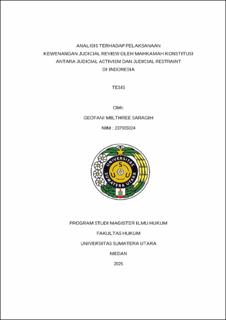| dc.description.abstract | The Constitutional Court (MK) in Indonesia faces a dilemma in the exercise of judicial review authority, namely choosing between judicial activism or judicial restraint approaches. Judicial activism encourages the Court to play an active role in interpreting the constitution in order to protect constitutional rights, while judicial restraint emphasizes the importance of being careful not to exceed the limits of legislative and executive authority. This debate creates a challenge for the Constitutional Court in determining the ideal approach in maintaining the balance of power and upholding the supremacy of the constitution. This research consists of three main studies. First, the urgency and position of the authority of judicial review by the Constitutional Court in the Indonesian state administration. Second, the development and urgency of the application of judicial activism and judicial restraint in the exercise of this authority. Third, the ideal concept that should be applied by the Constitutional Court in exercising its authority. This research uses normative legal research methods with philosophical, statutory, case, and comparative legal approaches. The results showed that the authority of judicial review has been known since before the establishment of the Constitutional Court in Indonesia, rooted in the basic concept of judicial power that has been applied in various countries in the world. In Indonesia, the Constitutional Court plays an important role as the guardian of the constitution to uphold the rule of law and strengthen democracy. The judicial activism approach allows judges to play an active role in interpreting the law to protect the constitutional rights of citizens, while judicial restraint emphasises the caution of judges not to interfere in legislative matters. Both approaches are applied contextually by the Constitutional Court in various decisions. This research finds that in an effort to achieve a balance between the protection of constitutional rights and harmony between state institutions, the Constitutional Court must assert clear limits on the application of judicial activism. As a recommendation, this research encourages the establishment of a Law on State Institutions to explicitly regulate the authority of each state institution, the codification of Constitutional Court decisions that reflect judicial activism, and the affirmation of the values of Pancasila and the 1945 Constitution in every legal interpretation. A directed and consistent application of judicial activism will strengthen the role of the Constitutional Court in maintaining constitutional justice in Indonesia. | en_US |


